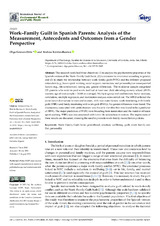Work–Family Guilt in Spanish Parents: Analysis of the Measurement, Antecedents and Outcomes from a Gender Perspective
Autor
Gómez Ortiz, Olga
Roldán-Barrios, Andrea
Editor
MDPIFecha
2021Materia
Work–Family Guilt ScaleParenthood
Emotion
Wellbeing
Guilt
Work–family conflict
Personality
METS:
Mostrar el registro METSPREMIS:
Mostrar el registro PREMISMetadatos
Mostrar el registro completo del ítemResumen
This research work had three objectives: (1) to analyze the psychometric properties of the Spanish version of the Work–Family Guilt Scale, (2) to examine its invariance according to gender, and (3) to study the relationship between work–family guilt (WFG) and the different proposed antecedent (e.g., hours spent working, social support, rumination, and personality) or consequential factors (e.g., life satisfaction), noting any gender differences. The incidental sample comprised 225 parents who were in paid work and had at least one child attending nursery school (49.1% women; age of total sample = 36.88 on average). Multiple-group and confirmatory factor analyses, correlations, multiple regression, and moderation analyses were carried out. The WFGS reflected the same factorial structure in men and women, with two main factors: work interfering with family guilt (WIFG) and family interfering with work guilt (FIWG). No gender differences were found. The discrepancy associated with perfectionism was the only variable that was found to be a predictor of FIWG. The major predictors of WIFG were brooding from rumination and the number of hours spent working. WIFG was also associated with lower life satisfaction in women. The implications of these results are discussed, stressing the need to promote work–family reconciliation policies.

